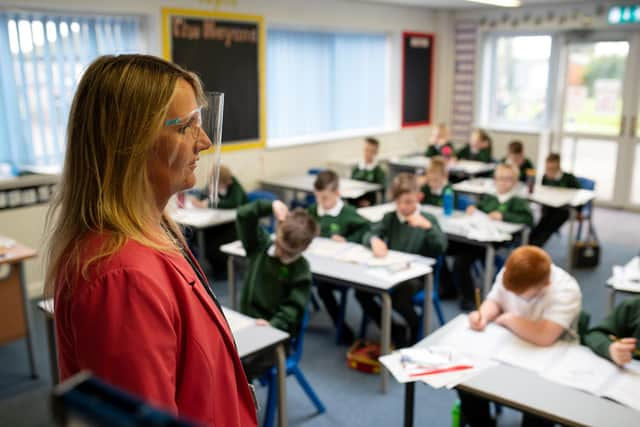Three groups of people who could be considered for next round of Covid vaccinations
and live on Freeview channel 276
Sir Simon Stevens told MPs today (January 26) that he hoped more treatments for Covid-19 would come on stream which, coupled with vaccination, would see a turn for the better.
He added that it “would be great” if the Covid vaccine and flu vaccine were combined into a single jab, if not for next winter then future ones.
Advertisement
Hide AdAdvertisement
Hide Ad“The first half of the year, vaccination is going to be crucial.


“I think a lot of us in the health service are increasingly hopeful that the second half of the year and beyond we will also see more therapeutics and more treatments for coronavirus.”
The NHS chief said there were a number of potential new treatments in the pipeline “and I think it is possible that over the course of the next six to 18 months, coronavirus becomes a much more treatable disease with antivirals and other therapies, which alongside the vaccination programme holds out the hope of a return to a much more normal future.”
Sir Simon also told the Health and Social Care Committee that vaccines were being used as fast as they arrived in the NHS, and more than half of those aged 75-79 have now had their first vaccine doses.
Advertisement
Hide AdAdvertisement
Hide Ad“We are at the moment pretty much using up each week’s vaccine as we get it, as we receive it through the safety testing, the batch testing, distribution to the NHS, then it gets sent out across the country,” he added.
Asked about vaccine priority, Sir Simon said teachers, police and people with learning disabilities will need to be considered for the next round of Covid-19 vaccinations, and suggested that this should perhaps happen as early as February.
“Our current proposition that once we have offered a vaccination to everyone aged 70 and above, and the clinically extremely vulnerable, then the next group of people would be people in their 60s and 50s, but there will also be a legitimate discussion in my view that the Joint Committee on Vaccination and Immunisation will have to advise on as to whether or not there are certain other groups who should receive that priority.
“People with learning disabilities and autism, certain key public service workers, teachers, the police, they will have to be factored in that post-February 15 prioritisation decision.”
Advertisement
Hide AdAdvertisement
Hide AdThe health boss said reducing the number of hospital beds occupied by Covid-19 patients was not “the only consideration” policymakers would take into account when deciding the vaccination priority list.
“Fundamentally, the most important thing is to get the overall infection rate down, this is not principally about pressure on the NHS, this is principally about reducing the avoidable death rate,” he added.
Vaccinating everyone aged 65 and over will have a “big impact” on the pressure on hospital beds, Sir Simon said, but added that about a quarter of hospital admissions for Covid are for people aged under 55, and about half of inpatient critical care bed days for coronavirus relate to patients under the age of 65.